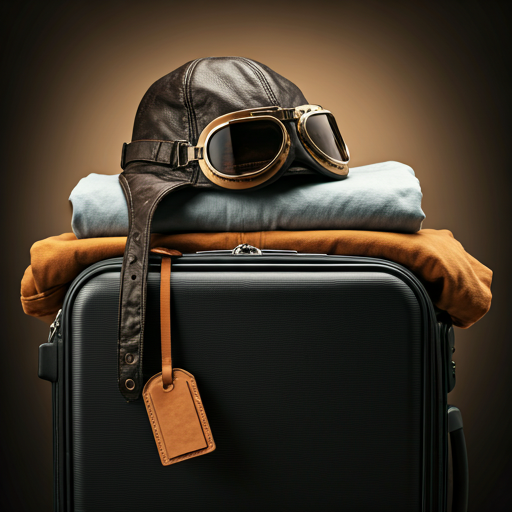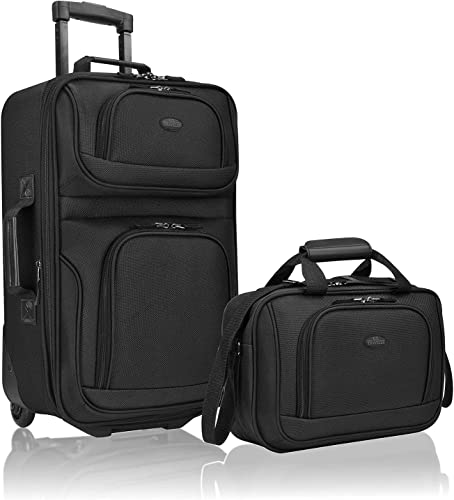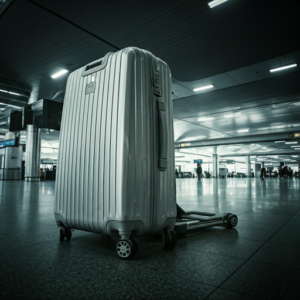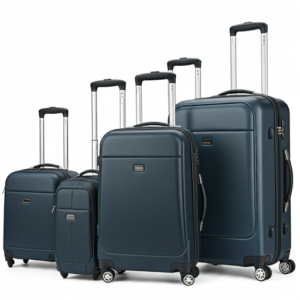Airline pilots use luggage that is designed to meet the demands of their unique and fast-paced lifestyle. So, what luggage do pilots use? They typically rely on rolling bags, duffel bags, and cabin-sized suitcases that offer durability, ease of access, and compact design. Key features airline pilots look for include durable materials that withstand frequent use, lightweight construction for easy mobility, and practical compartments such as laptop sections for work essentials. These luggage choices allow pilots to stay organized, efficient, and ready for both work and leisure while on the go. In the following sections, we will explore the best luggage types and brands that pilots trust to handle their extensive travel needs.
Table of Contents
Why Pilots Need Special Luggage for Travel
Pilots often face unique travel circumstances due to their constant travel. Unlike typical travelers, they are constantly on the move with little control over how or when their travel happens. So, what luggage do pilots use? It must not only hold personal items but also withstand the wear and tear of continuous use. Pilots need luggage that helps them stay organized, mobile, and prepared for both work and leisure on the go.

The Unique Demands of Pilots’ Travel Lifestyles
Pilots’ travel involves long hours, irregular schedules, and constant time zone changes. So, what luggage do pilots use? Their luggage needs to be both functional and efficient, ensuring they have quick access to essential items. Whether it’s a laptop compartment for work, durable materials for frequent use, or space-saving designs for tight cabin spaces, pilots require luggage that adapts to their lifestyle.
Types of Luggage Pilots Prefer
When it comes to the types of luggage pilots prefer, practicality and comfort are key. A great bag for pilots is one that combines durability with functionality, ensuring it can withstand the rigors of frequent travel. Pilots tend to choose pieces that are easy to maneuver, durable, stylish and versatile enough to accommodate their needs across various destinations.
Rolling Luggage vs. Duffel Bags: What’s Best for Pilots?
Rolling luggage is favored by many pilots because of its ease of mobility and organizational capacity. The smooth wheels allow for effortless movement through busy airports, and the rigid structure provides durability. On the other hand, duffel bags offer flexibility and can be more lightweight. The choice between the two often depends on the airline pilot himself’s preference for structure versus flexibility.
Cabin Luggage with Laptop Compartment: A Must-Have for Pilots
A well-organized cabin bag with a dedicated laptop compartment is crucial for pilots. This specialized luggage keeps tech equipment easily accessible and well-protected. Many pilots opt for cabin luggage with additional compartments for storing essential documents, headsets, and other work tools. The ability to quickly retrieve work materials while in transit is invaluable.
Hard-Shell vs. Soft-Shell Luggage: Which One Wins for Pilots?
Hard-shell luggage offers maximum protection against impacts, ensuring that delicate items remain safe during travel. However, soft-shell luggage provides more flexibility and can expand to accommodate extra items. While hard-shell is more durable, soft-shell may be preferred by pilots who need to pack efficiently and adjust their luggage based on varying travel needs.
Key Features Pilots Look for in Luggage
Pilots are discerning when it comes to luggage. The key features they prioritize reflect their specific travel needs and desire for efficiency.
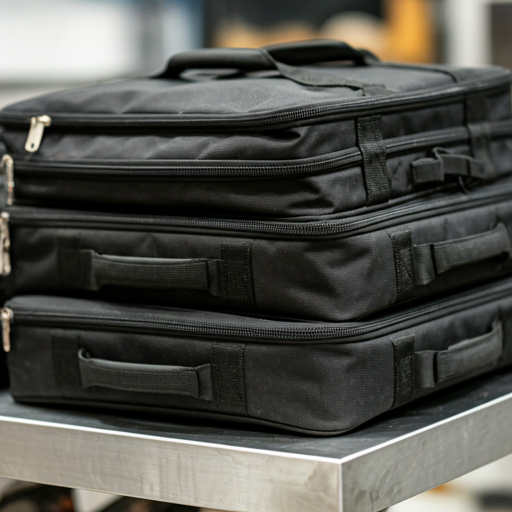
Durability: Why Tough Luggage is Essential for Pilots
Given their frequent travel, pilots need luggage that stands up to constant handling. Durable luggage made from materials like polycarbonate or ballistic nylon can withstand the rigors of repeated check-ins, tight airport spaces, and harsh weather conditions. Quality construction ensures that luggage lasts longer, even with the stresses of constant use, making brands like TravelPro the industry standard for airline professionals.
Lightweight Materials: Ensuring Easy Mobility
Lightweight luggage is essential for pilots who are constantly moving between terminals, flights, and layovers. With the added weight of equipment and personal items, having luggage that’s easy to carry or roll is a must. Lightweight materials like aluminum or high-strength plastics help reduce the overall load, allowing pilots to travel lighter with less strain.
Compact Design: Space-Saving Solutions for Tight Cabin Spaces
Pilots often face cramped cabins, both in the cockpit and on commercial flights. Compact luggage that fits easily in overhead compartments or under seats is vital. Luggage with a sleek design, without sacrificing interior space, is ideal for pilots who need to maximize their limited space while still being able to carry everything they need.
Multi-Functionality: Combining Luggage with Work Tools
Pilots don’t just carry clothing—they also need to bring work tools, such as headsets, documents, and sometimes even flight equipment. Features like a J-Hook attachment allow pilots to hang additional bags, maximizing space and convenience during travel. Luggage with multiple compartments or built-in organizational systems helps keep everything in its place, ensuring that pilots and flight attendants are always prepared for their next shift, no matter where they are.
Popular Luggage Brands Trusted by Pilots
Over time, certain luggage brands have earned the trust of pilots and airline industry, offering the durability and features needed for their demanding travel schedules.
The Top Brands Pilots Swear By
Brands like Samsonite, Travelpro, Briggs & Riley, and Tumi are favorites among pilots due to their reputation for quality and reliability. The Luggage Works bag is also highly regarded for its durability and long-lasting quality. These brands offer a variety of options tailored to the specific needs of frequent travelers, with features like durable wheels, sturdy zippers, and compartmentalized interiors.
The Features Pilots Look for in These Trusted Brands
When choosing a brand, pilots prioritize key features such as robust durability, easy mobility, and professional aesthetics. Brands like TravelPro are popular for their designs that include replaceable parts, enhancing the longevity and value of the luggage. Trusted brands offer luggage with smooth-rolling wheels, high-quality materials that resist wear and tear, and sleek designs that can withstand the test of time and heavy usage.
Price vs. Quality: What’s Worth the Investment for Pilots?
Pilots understand the importance of investing in high-quality luggage, knowing it will save time, energy, and money in the long run. While some brands are pricey, the added cost often correlates with better durability, smoother functionality, and longer lifespan. However, for pilots on a budget, there are still reliable options that balance affordability with quality.
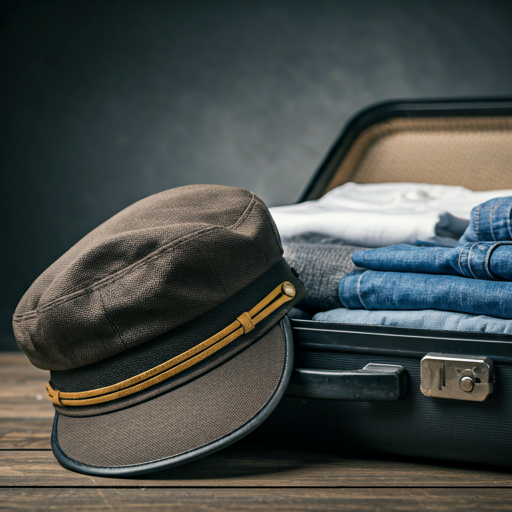
The Importance of Organization: Pilot’s Luggage Interior
A pilot’s luggage must not only look good on the outside but the luggage works also be designed for optimal organization inside. Efficient use of space and easy access to essential items is crucial for pilots during their travels.
Organizational Compartments: Keeping Gear Neat and Accessible
Pilots rely on organized compartments within their luggage to separate personal items, work tools, and documents. Multiple pockets and dividers keep everything in place, making it easier to find what they need quickly. Whether it’s a side pocket for a phone or a larger compartment for a uniform, having a well-thought-out interior layout is essential.
Laptop Compartments and Tech Organization for Pilots
As technology plays a significant role in a pilot’s work, many choose luggage with dedicated laptop compartments. This specialized storage helps protect sensitive tech equipment from bumps and jostles, while also ensuring it remains easily accessible when needed.
Smart Packing: How Pilots Maximize Space Efficiency
Pilots are expert packers, often making the most of the limited space they have. Luggage with spinner wheels is particularly favored for its enhanced maneuverability, allowing pilots to navigate through airports with ease. Using packing cubes overhead bins, rolling clothes, and other space-saving strategies, pilots ensure they can carry everything they need without overpacking. Smart packing ensures that everything fits in a compact, organized manner, reducing clutter and making travel more efficient.
The Role of Luggage on Layovers: What Pilots Pack for Convenience
For pilots, layovers are a regular part of their travel routine. The luggage they choose plays a significant role in making layovers more comfortable and manageable.
Essentials Pilots Pack for Short Layovers
During short layovers, pilots typically pack only a backpack with the essentials—clothing, toiletries, and tech gadgets. Being well-prepared with the right essentials ensures a smoother experience for their next trip. Compact luggage allows them to quickly grab what they need without overpacking. The ability to move through airports quickly is crucial, so pilots prefer luggage that makes this process seamless.
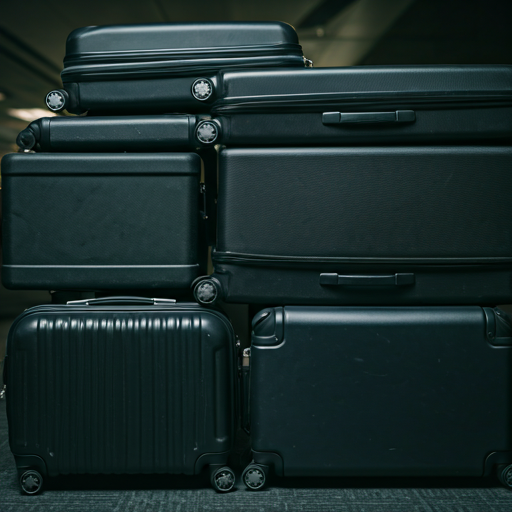
Comfort Items Pilots Always Carry for Long Hauls
On longer layovers or flights, pilots often carry comfort items such accessories such as sleep masks, neck pillows, and snacks. Luggage designed to accommodate these items without taking up too much space ensures pilots stay comfortable during downtime between flights.
How Pilots Adapt Their Luggage for Different Time Zones
Pilots are masters at adjusting to new time zones quickly. Their luggage often includes items to help with jet lag, such as sleep aids or portable chargers. Luggage that can accommodate these needs, along with efficient packing for quick access, helps pilots stay on top of their demanding schedules.
Carry-On Luggage: The Pilot’s Must-Have for Quick Access
For pilots, carry-on luggage is indispensable for quick access to essential items during flights and layovers. This type of luggage allows for easy storage of valuables and work-related tools, all within reach when needed.
The Benefits of Carry-On Luggage for Pilots
Carry-on luggage allows pilots to keep important items close by during flights, such as personal electronics, documents, and other necessities. With their hectic schedules flying alone, being able to access these items quickly is a priority.
Security Considerations: What Pilots Need in Their Carry-On Bags
Pilots’ carry-on bags must adhere to strict security regulations. They typically carry only essential items that are permitted through security checkpoints, such as documents, electronics, and medications. Compact, well-organized bags make passing through security a smoother experience.
How Pilots Choose the Right Size for Carry-On Luggage
Pilots choose carry-on luggage that complies with airline regulations for size and weight. The right carry-on is small enough to fit in overhead compartments but large enough to hold the essentials. Many pilots prefer soft-shell bags, as they can compress slightly to make pilot bags fit into various compartments without compromising on space.
Durability in the Sky: How Pilots Ensure Their Luggage Stands Up to the Test
Pilots understand that their luggage must endure constant handling, exposure to varying weather conditions, and the rigors of frequent travel.
Materials That Withstand the Rigors of Frequent Travel
Materials like polycarbonate, ballistic nylon, and high-strength plastics are essential for luggage that needs to withstand repeated travel. These materials offer superior durability and resistance to damage, keeping the luggage in good condition despite frequent use.
Weather-Proof Features in Pilot Luggage
Weather-proof features, like water-resistant zippers and durable, weatherproof exteriors, are essential for pilots who often face inclement conditions while traveling. These features ensure their luggage and contents remain safe, no matter the weather conditions during their travels.
Conclusion: Choosing the Right Luggage for Pilots
Pilots need luggage that meets their specific travel demands—durable, efficient, and easy to handle. Whether they prefer rolling luggage or duffel bags, the key is finding a solution that offers both flexibility and protection for their gear. From organizational compartments to weather-resistant materials, pilots rely on luggage that helps them stay organized, comfortable, and prepared for anything that comes their way. By choosing the right luggage, pilots can focus on what matters most—ensuring a smooth and safe journey for themselves and their passengers.
